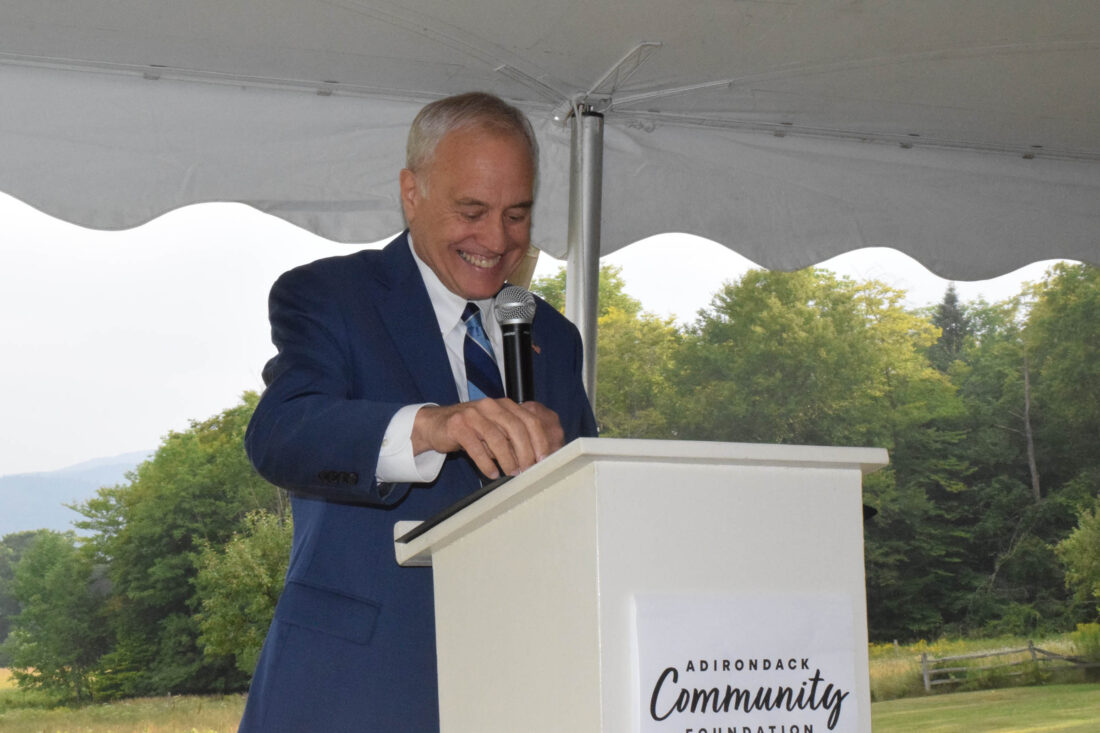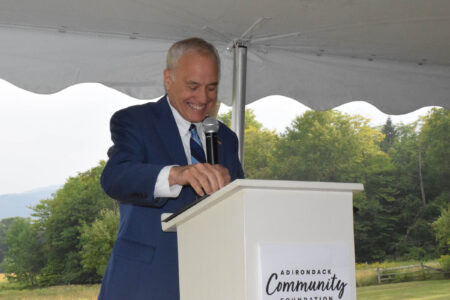State Comptroller warns of funding challenges, touts role of nonprofits

State Comptroller Thomas DiNapoli gave the keynote speech at an annual Adirondack Community Foundation event on Friday, Aug. 8 at Heaven Hill Farm. (Enterprise photo — Grace McIntyre)
LAKE PLACID — State Comptroller Thomas DiNapoli warned at an event on Friday, Aug. 8 that federal cuts and other funding challenges are likely to impact access to services in rural North Country communities. The state is committed to helping, he said, but won’t be able to fill in the gap completely.
At the Adirondack Community Foundation’s annual summer party, DiNapoli highlighted some of the rural needs that have surfaced in data and reports from his office, including shortages of medical providers. DiNapoli added that nonprofits play a key role in helping address community needs.
ACF CEO Cali Brooks said in her address that the foundation sees itself as a bridge between those who have enough wealth to make a big impact in the community and those who are experiencing the problems that the funds can address. This ensures that those who want to be generous can do so with a greater impact.
“Charitable giving goes so much further in a place like this,” Brooks said. “While philanthropy cannot make up for these shortfalls, Adirondack Community Foundation is positioned to be responsive.”
In response to the unique challenges this year has brought, Brooks said the foundation’s strategy is to become more “nimble and responsive.” This has meant a lot more communication with nonprofits and members of the community, as the foundation looks for new ways to foster collaboration between organizations, public and private, to creatively address needs.
“I think people are in a positive state of mind and we have real opportunities to build on some positive momentum that’s happening in this region,” she said. “It’s going to be tough and we’re going to have to come together and work hard together.”
In general, the ACF is working to strengthen the social safety net, which includes addressing issues like availability of high-paying jobs, workforce housing and child care. Brooks said these are not new efforts, but they have an added sense of urgency with the looming threat of funding cuts.
Lisa Bramen, the foundation’s director of communications, said they do not know of very many grants being canceled in recent months, but that uncertainty around future availability of funding from federal agencies has persisted.
The changes with the new administration have included some positive ones that could be helpful for local families, Brooks said. The recent reconciliation bill raised the child tax credit and created “Trump” accounts for newborns, so the foundation has been able to point people toward these resources.
When it comes to funding cuts, the foundation is trying to communicate with partners and be proactive to be able to anticipate needs that might arise. Brooks said the foundation’s strength is being able to look at issues with a broad lens, see opportunities and gaps and bring the right people together.
For example, in response to the SNAP cuts, which Brooks said are likely to take effect sooner than the Medicaid cuts, the foundation is considering opening up a fund to support small grants for small food pantries.
As for the state’s role, Brooks said it has been generous in its support of social services in the past and has been a good partner in trying to meet the needs of the community. It can’t solve all of the problems, though.
“We’re a rural, resilient community,” she said. “We’ve been through hard times before, we’re gonna go through hard times again. I would say it’s going to be rough, but we’re going to get through it.”
–
Comptroller assesses rural needs
–
The Comptroller’s remarks on Friday were largely focused on a report recently released by his office on shortages of health professionals in rural areas. The good news is that Essex County is in better shape than some other rural counties. The bad news is that the North Country as a whole tends to have much lower ratios of various types of physicians compared to the state average, DiNapoli said.
According to the report, the North Country has about one pediatrician for every 10,000 people, compared to 2.8 for the state. There are 9.6 mental health practitioners for every 10,000 people in the North Country, whereas there are 16.1 for the state. There are 0.7 OB-GYN physicians for every 10,000 people in the North Country, compared to 1.7 for the state.
In Hamilton County, there are no dentists or OB-GYNs, DiNapoli reported.
DiNapoli said there is a concern that changes to Medicaid that are likely to lead to people losing coverage will exacerbate shortages in services that already exist. On average, 30% of North Country residents rely on Medicaid or the Essential Plan, he said, and an estimated 44,000 people will lose coverage once the changes take effect. This represents one in three people relying on Medicaid in the region.
“These rural hospitals are barely making it as it is, and those cuts in Medicaid are going to impact their bottom line and ability to keep doing business,” he said.
His office is just starting to analyze the impact of Medicaid funding cuts. He said the cuts that are going to impact the state this year might be absorbed through a combination of reserve funds and tax revenue that is coming in higher than projected. However, DiNapoli said next year’s costs will be more difficult to absorb.
Another concern is shortages in the medical workforce. DiNapoli pointed out that there is now a limit of $200,000 for student loans for medical students. The median cost of medical school in 2024 was $280,000, according to DiNapoli.
He emphasized that the state has a difficult task ahead, finding ways to prioritize spending and cover for some of the federal cuts.
“It’s going to be a real challenge, and I think there’s going to be a big debate about spending, a big debate about revenue,” he said. “It’s going to be so important for you to communicate with your legislators as to what your priorities are.”
He added that nonprofits are needed, not only as valuable employers, but as grassroots movements that know the needs of their communities.
“The government can’t do it all, the private sector can’t do it all, and the nonprofits are a very key component of the puzzle to have us navigate through these challenging times,” he said. “You’re on the front lines, and you always have been.”




